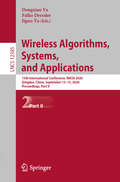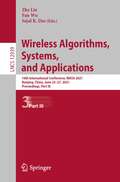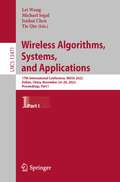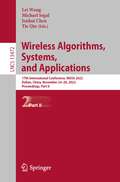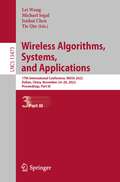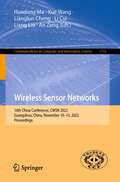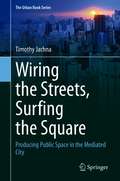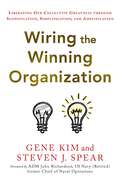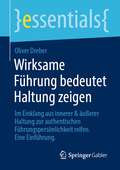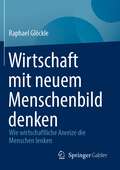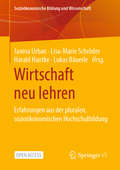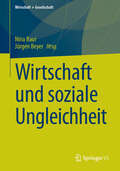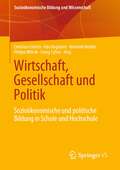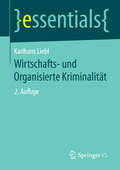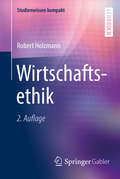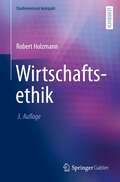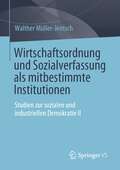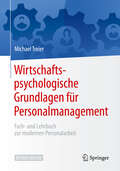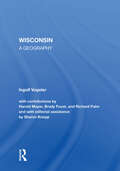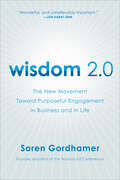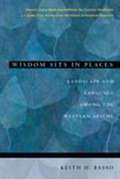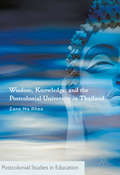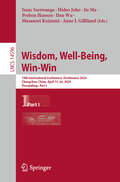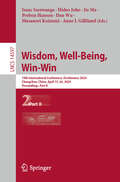- Table View
- List View
Wireless Algorithms, Systems, and Applications: 15th International Conference, WASA 2020, Qingdao, China, September 13–15, 2020, Proceedings, Part II (Lecture Notes in Computer Science #12385)
by Falko Dressler Jiguo Yu Dongxiao YuThe two-volume set LNCS 12385 + 12386 constitutes the proceedings of the 15th International Conference on Wireless Algorithms, Systems, and Applications, WASA 2020, which was held during September 13-15, 2020. The conference was planned to take place in Qingdao, China; due to the COVID-19 pandemic it was held virtually. The 67 full and 14 short papers presented in these proceedings were carefully reviewed and selected from 216 submissions. The papers focus on data path algorithms; control path algorithms; network protocol design; network security; network services; and cloud computing.
Wireless Algorithms, Systems, and Applications: 16th International Conference, WASA 2021, Nanjing, China, June 25–27, 2021, Proceedings, Part III (Lecture Notes in Computer Science #12939)
by Fan Wu Sajal K. Das Zhe LiuThe three-volume set constitutes the proceedings of the 16th International Conference on Wireless Algorithms, Systems, and Applications, WASA 2021, which was held during June 25-27, 2021, in Nanjing, China.The 103 full and 57 short papers presented in these proceedings were carefully reviewed and selected from 315 submissions. Part III of the set includes the papers of the contributors that took part in the workshops co-located with the conference.The following topics are covered in the volume: network protocols, signal processing, wireless telecommunication systems, routing algorithms, cryptography, local area networks, and others.
Wireless Algorithms, Systems, and Applications: 17th International Conference, WASA 2022, Dalian, China, November 24–26, 2022, Proceedings, Part I (Lecture Notes in Computer Science #13471)
by Lei Wang Tie Qiu Michael Segal Jenhui ChenThe three-volume set constitutes the proceedings of the 17th International Conference on Wireless Algorithms, Systems, and Applications, WASA 2022, which was held during November 24th-26th, 2022. The conference took place in Dalian, China.The 95 full and 62 short papers presented in these proceedings were carefully reviewed and selected from 265 submissions. The contributions in cyber-physical systems including intelligent transportation systems and smart healthcare systems; security and privacy; topology control and coverage; energy-efficient algorithms, systems and protocol design
Wireless Algorithms, Systems, and Applications: 17th International Conference, WASA 2022, Dalian, China, November 24–26, 2022, Proceedings, Part II (Lecture Notes in Computer Science #13472)
by Lei Wang Tie Qiu Michael Segal Jenhui ChenThe three-volume set constitutes the proceedings of the 17th International Conference on Wireless Algorithms, Systems, and Applications, WASA 2022, which was held during October 28-30, 2022. The conference took place in Dalian, China.The 95 full and 62 short papers presented in these proceedings were carefully reviewed and selected from 265 submissions. The contributions in algorithms, systems; and applications of internet of things;information processing and data management;radar and sonar networks
Wireless Algorithms, Systems, and Applications: 17th International Conference, WASA 2022, Dalian, China, November 24–26, 2022, Proceedings, Part III (Lecture Notes in Computer Science #13473)
by Lei Wang Tie Qiu Michael Segal Jenhui ChenThe three-volume set constitutes the proceedings of the 17th International Conference on Wireless Algorithms, Systems, and Applications, WASA 2022, which was held during October 28-30, 2022. The conference took place in Dalian, China.The 95 full and 62 short papers presented in these proceedings were carefully reviewed and selected from 265 submissions. The contributions in theoretical frameworks and analysis of fundamental cross-layer protocol and network design and performance issues; distributed and localized algorithm design and analysis; information and coding theory for wireless networks; localization; mobility models and mobile social networking; underwater and underground networks; vehicular networks; algorithms, systems, and applications of edge computing
Wireless Sensor Networks: 16th China Conference, CWSN 2022, Guangzhou, China, November 10–13, 2022, Proceedings (Communications in Computer and Information Science #1715)
by Li Cui Liang Liu Xue Wang Huadong Ma An Zeng Lianglun ChengThis book constitutes the refereed proceedings of the 16th China Conference on Wireless Sensor Networks, CWSN 2022, which took place in Guangzhou, China, in November 2022. The 17 full papers presented in this volume were carefully reviewed and selected from 204 submissions, including 87 English papers and 117 Chinese papers. The conference provided an academic exchange of research and a development forum for IoT researchers, developers, enterprises, and users. Exchanging results and experience of research and applications in IoT, and discussing the key challenges and research hotspots, is the main goal of the forum. As a high-level forum for the design, implementation, and application of IoT, the conference promoted the exchange and application of the oriesand technologies of IoT-related topics.
Wiring the Streets, Surfing the Square: Producing Public Space in the Mediated City (The Urban Book Series)
by Timothy JachnaThis book investigates the production of public space in contemporary urban contexts as conditioned by the suffusion of urban life with digital technologies. A “social production of technology” approach is taken to frame the digitally-mediated city as a communal social and cultural project. Acknowledging the multivalent and shifting nature of public space and the heterogeneity of the urban actors who form it, the “agency” of these different actors in appropriating digital technologies takes center stage. The dynamics of negotiations between regimes of control and impulses towards freedom and experimentation, the entanglement of the spatial commons and the digital commons, changes in the notions of what constitutes membership in a public or counterpublic, and evolving relationships between the various individuals and groups who share and constitute public space, are all revealed in different actors’ appropriation of digital technologies in the formation of public spaces and the conducting of public life in cities.The book is divided into two sections. Drawing on classic and contemporary scholars on public space, and on digital culture, Section I explores the implications of the convergence of these bodies of knowledge and lenses of critique and examination on the present urban condition, establishing a conceptual foundation upon which public space discourse is brought to bear on an interrogation of the “wired” or “mediated” city. Structured by the core concepts that underlie Hannah Arendt’s notion of agency in the constitution of the public sphere, Section II is devoted to discussing, and demonstrating through myriad concrete examples, how different “affordances” of digital technologies are implicated in the production of public space and in the interplay between urban governance and control, urban life and citizenship, and urban commodification. The topics in this book are of broad and current international relevance, and will appeal to scholars and students in architecture, urbanism, design, sociology, and digital culture.
Wiring the Winning Organization: Liberating Our Collective Greatness through Slowification, Simplification, and Amplification
by Steven J. Spear Gene Kim&“Elegant and simple. It&’s a teacher&’s best companion―a lesson plan for teaching the theory of performance.&” ―Adm. John Richardson (ret.), from his foreword to the book&“This book is a must-read that deeply informs leaders on how to create great systems for outstanding performance and to win.&” ―Jeffrey K. Liker, PhD, author of The Toyota Way, 2nd edition A 2024 Eric Hoffer Book Award Finalist and Shortlisted for the 2024 Business Book Award.Forget vision, grit, or culture. Wiring the Winning Organization reveals the hidden circuitry that drives organizational excellence.Drawing on decades of meticulous research of high-performing organizations and cross-population surveys of tens of thousands of employees, award-winning authors Gene Kim and Dr. Steven J. Spear introduce a groundbreaking new theory of organizational management. Organizations win by using three mechanisms to slowify, simplify, and amplify, which systematically moves problem-solving from high-risk danger zones to low-risk winning zones.Wiring the Winning Organization shines an investigative light on some of the most famous organizations, including Toyota, Amazon, Apple, and NASA, revealing how leaders create the social wiring that enables exceptional results.This is not feel-good inspiration or armchair philosophy but a data-driven prescriptive playbook for creating excellence grounded in real-world results and proven theory. This is the rare business book that delivers concrete tools―not platitudes―to convert mediocrity into mastery.&“All organizations, large and small, public and private, are overwhelmed by complexity, multiple priorities, conflicting goals, shifting landscapes, and constrained resources. Kim and Spear lay out an amazing vision of the social circuitry for organizations to not only handle this but thrive while doing so.&” ―Phil Venables, Chief Information Security Officer, Google Cloud; former Board Director, Goldman Sachs Bank&“This book clearly teaches you how to rewire your organization to move with focused, sustained urgency and win!&” ―Courtney Kissler, SVP Customer and Retail Technology, Starbucks&“In a world where complexity is the norm, Kim and Spear provide the essential guide for those in need of a compass for the maze of today&’s business environment.&” ―David Silverman, CEO of CrossLead, co-author of Team of Teams
Wirksame Führung bedeutet Haltung zeigen: Im Einklang aus innerer & äußerer Haltung zur authentischen Führungspersönlichkeit reifen. Eine Einführung (essentials)
by Oliver DreberDieses Buch ist eine Einführung in den Themenkomplex der Führung durch Haltung. Es bietet eine pragmatische Anleitung zur Selbstreflexion mit dem Ziel der Persönlichkeitsentwicklung. Theoretisches Grundlagenwissen zu Persönlichkeit & Führung wird mit neurowissenschaftlichen Erkenntnissen aus dem Embodiment und aktiven Körperwahrnehmungsübungen kombiniert. Ganz nach dem Motto des Autors: „Raus aus dem Kopf, rein in den Körper.“.Empathie, bedürfnisorientierte Kommunikation, aktives Zuhören, Integrität, Loyalität, Kreativität, Resilienz & Achtsamkeit sind nur einige der new work soft skills, die für erfolgreiche Führung immer bedeutsamer werden. Doch kaum einer wird mit all diesen Sozialkompetenzen geboren. Wir müssen uns diese im Laufe unserer persönlichen Entwicklung meist erst erwerben. Wenn wir das tun, bildet sich Schicht um Schicht eine individuelle Persönlichkeit. Im Zuge dieser Reifung entstehen auch unsere Haltungen. Eine Haltung ist nicht nur ein mentales Konstrukt (innere Haltung), sondern findet immer auch Niederschlag in einer äußeren Haltung (Körperhaltung). Erst wenn innere wie äußere Haltung miteinander korrespondieren, kann eine authentische und damit wirksame Führungspersönlichkeit entstehen.
Wirtschaft mit neuem Menschenbild denken: Wie wirtschaftliche Anreize die Menschen lenken
by Raphael GlöckleDie theoretische Volkswirtschaftslehre unterscheidet sich deutlich von der praktischen Gestaltung einer Volkswirtschaft. In der klassischen und neoklassischen Theorie tendieren die Märkte ständig hin zu ihrem Gleichgewicht und Optimum, wenn die Politiker nur die Finger von allen Wirtschaftsregeln lassen würden. Die Politiker sind jedoch nicht dumm, sondern sie sehen Probleme (Bsp. Umweltzer-störung, ungleiche Einkommens- und Vermögensverteilung, tricksende und betrügende Unternehmen, schlechte Arbeitsbedingungen, Inflation, marktbeherrschende Stellungen), die es eigentlich nicht ge-ben dürfte. Sie erlassen immer wieder neue Gesetze. Da stellt sich die Frage: Weichen die Politiker von der Theorie ab und deswegen kommt es zu Marktversagen oder weichen die volkswirtschaftlichen Theorien zu stark von der Realität ab, sodass sie in vielen Fällen in der Praxis unbrauchbar sind? In diesem Buch wird das Wirtschaftssystem als ein Anreizsystem beschrieben, dass über die Gesell-schaft gelegt wird. Die Menschen reagieren auf Belohnung (Einkommen, Beförderung, Gehaltserhö-hung, Status) und Bestrafung (Einkommensverlust, Kündigung, gesetzliche Strafen, Statusverlust). Der Preis ergibt sich nicht auf magische Weise durch Angebot und Nachfrage. Stattdessen haben tau-schende Menschen eine gewisse Verhandlungsmacht, die je nach Situation unterschiedlich ist und zu unterschiedlichen Preisen und Margen führt.
Wirtschaft neu lehren: Erfahrungen aus der pluralen, sozioökonomischen Hochschulbildung (Sozioökonomische Bildung und Wissenschaft)
by Lukas Bäuerle Janina Urban Lisa-Marie Schröder Harald HantkeDieser Open-Access-Sammelband vereint strukturierte Erfahrungsberichte und Reflexionen von Hochschullehrenden und Studierenden in der pluralen, sozioökonomischen Hochschulbildung. Neben der konkreten Inspiration, die diese Beiträge für andere Lehrende darstellen sollen, werden mit diesem Band erste Bausteine für eine plurale, sozioökonomische Hochschuldidaktik entwickelt. Sie verfolgt das Ziel, die Reflexion der gesellschaftlichen Bedingungen und die soziale Einbettung von ökonomischen Fragestellungen zum integralen Bestandteil eines jeden wirtschaftsbezogenen Studiums zu machen.
Wirtschaft und soziale Ungleichheit (Wirtschaft + Gesellschaft)
by Jürgen Beyer Nina BaurDer Band leistet einen Beitrag zu der zunehmend fragmentierten Debatte zum Verhältnis von Wirtschaft und sozialer Ungleichheit. Die Untersuchung des Verhältnisses zwischen Wirtschaft und sozialer Ungleichheit ist eine der ältesten Fragen, mit denen sich die Soziologie befasst, und gewinnt vor dem Hintergrund der Krisen der vergangenen Jahre wieder zunehmend an Bedeutung. Aktuell wird in der Soziologie das Thema vor allem unter vier Aspekten diskutiert: (1) die Wahrnehmung und Bewertung von Auf- und Abstiegen und Vermögenslagen, (2) die extreme Ungleichheit aufgrund von „Winner-Take-all“-Phänomenen, (3) die Analyse von die Ungleichheit prägenden Einflüssen, die im Zusammenhang mit neuen Formen des unternehmerischen Handelns, neuen Möglichkeiten zur Koordinierung von Arbeit und nachhaltigeren Organisationsweisen stehen, sowie (4) die ländervergleichende Analyse von Abhängigkeiten zwischen Zentrum und Peripherie
Wirtschaft, Gesellschaft und Politik: Sozioökonomische und politische Bildung in Schule und Hochschule (Sozioökonomische Bildung und Wissenschaft)
by Christian Fridrich Reinhold Hedtke Georg Tafner Udo Hagedorn Philipp MittnikDie Verflechtungen von Wirtschaft, Gesellschaft und Politik bestimmen so offensichtlich die sozioökonomischen und politischen Strukturen und Problemlagen, die gegenwärtigen Denk- und Handlungsweisen sowie die kollektive Wahrnehmung von Lösungsoptionen, dass ihre immer noch geringe Beachtung in Hochschullehre und Schulbildung verwundert. Phänomene wie Pandemien, Klimawandel, Migration oder Autoritarismus machen die engen, komplexen und widersprüchlichen Zusammenhänge von Wirtschaft, Gesellschaft und Politik aktuell erfahrbar. Vor diesem Hintergrund ist Aufklärung durch sozioökonomische Forschung, Lehre und Bildung dringend geboten. Dazu will der Themenband beitragen, indem er Forschungsbeiträge zu Problemkomplexen wie Wirtschaft und Demokratie, Perspektivität und Multiperspektivität, Situation, Interesse und Politik, Subjekt und Subjektivierung sowie Disziplin und Curriculum präsentiert.
Wirtschafts- und Organisierte Kriminalität (essentials)
by Karlhans LieblDieses Bucherklärt, was man unter Wirtschafts - undOrganisierter Kriminalität versteht und welche Deliktstrukturen sich dahinter verbergen. Der Autor Karlhans Liebl stellt die gegenwärtige Situation der Wirtschafts- undOrganisierten Kriminalität in Deutschland umfassend dar und greift dabei auchBezüge zum Ausland auf.
Wirtschaftsethik (Studienwissen kompakt)
by Robert HolzmannDas Lehrbuch ermöglicht einen schnellen Einstieg in (wirtschafts-)ethische Grundlagentheorien sowie in die moralische Verhaltensökonomik, die angesichts weitreichender Unternehmensskandale zunehmend in den Fokus akademischer Lehrpläne rückt. In prägnanter, verständlicher Weise werden die wesentlichen (wirtschafts-)ethischen sowie moralpsychologischen Theorien erläutert. Kurze Lerneinheiten, übersichtliche didaktische Module sowie die begleitende Lernkontrolle sorgen für eine nachhaltige Wissensvermittlung. Es richtet sich damit an alle, die sich mit Fragen der Wirtschaftsethik im Rahmen ihrer Aus- und Weiterbildung (auch im Nebenfach) sowie ihrer beruflichen Praxis auseinandersetzen.
Wirtschaftsethik (Studienwissen kompakt)
by Robert HolzmannDas Lehrbuch ermöglicht einen schnellen Einstieg in (wirtschafts-)ethische Grundlagentheorien sowie in die moralische Verhaltensökonomik, die angesichts weitreichender Unternehmensskandale zunehmend in den Fokus akademischer Lehrpläne rückt. In prägnanter, verständlicher Weise werden die wesentlichen (wirtschafts-)ethischen sowie moralpsychologischen Theorien erläutert. Kurze Lerneinheiten, übersichtliche didaktische Module sowie die begleitende Lernkontrolle sorgen für eine nachhaltige Wissensvermittlung. Es richtet sich damit an alle, die sich mit Fragen der Wirtschaftsethik im Rahmen ihrer Aus- und Weiterbildung (auch im Nebenfach) sowie ihrer beruflichen Praxis auseinandersetzen.
Wirtschaftsordnung und Sozialverfassung als mitbestimmte Institutionen: Studien zur sozialen und industriellen Demokratie II
by Walther Müller-JentschDie in diesem Band versammelten Beiträge befassen sich im weitesten Sinne mit der Rolle der Mitbestimmung und Mitwirkung von Gewerkschaften und betrieblichen Interessenvertretungen bei der Ausgestaltung der Wirtschaftsordnung und der Sozialverfassung in Deutschland. Wird mit Wirtschaftsordnung vornehmlich die der Sozialen Marktwirtschaft gemeint, dann mit Sozialverfassung primär die betrieblichen und die den Arbeitsmarkt regulierenden Direktiven, Konventionen und sozialen Praktiken. Als Institutionen sind sie im Sinne normierter Verhaltens- und Handlungsmuster zu verstehen. Die Beiträge schließen als „Studien zur sozialen und industriellen Demokratie“ an die im Vorgängerband „Arbeit und Bürgerstatus“ (2008) veröffentlichten Arbeiten des Verfassers zur Grundlegung der Industriellen Beziehungen als einer sozialwissenschaftlichen Teildisziplin an, die wiederum – analog zum angelsächsischen Wissenschaftsverständnis – als ein interdisziplinäres Forschungsfeld mit Segmenten aus der Soziologie und Ökonomie, den Politik- und Rechtswissenschaften zu verstehen ist. Zugleich können die Beiträge als historische und theoretische Studien in der von den Kathedersozialisten begründeten und von Max Weber weitergeführten Tradition der Sozialökonomie gelesen werden. Gegenstand dieser an einigen deutschen Universitäten wiederbelebten Studienrichtung sind die Wechselwirkungen zwischen Wirtschaft, Politik und Gesellschaft. Deren Untersuchung und Analyse stehen in gewisser Weise quer zu den etablierten disziplinären Taxonomien.
Wirtschaftspsychologie für Bachelor (Springer-Lehrbuch)
by Christian FichterDie Wirtschaft ist heute nicht mehr ohne das Fachwissen der Psychologie zu verstehen! Dieses Lehrbuch gibt einen kompakten und doch vollständigen sowie praxisnahen Überblick über die Wirtschaftspsychologie. Es ordnet die Disziplin historisch ein und bietet eine ebenso kurzweilige wie interessante Darstellung aller relevanten Kernthemen. Durch viele Praxisbezüge, Definitionen, Lernziele, Kontrollfragen und Hinweise auf vertiefende Literatur ist es sehr lernfreundlich gestaltet, zusätzlich fasst eine ausführliche Randspalte das Wichtigste zusammen. Eine Begleitwebsite auf www.lehrbuch-psychologie.springer.com bietet zahlreiche Zusatztexte, Lern-Tools für Studierende sowie Dozentenmaterialien.
Wirtschaftspsychologische Grundlagen für Personalmanagement: Fach- und Lehrbuch zur modernen Personalarbeit
by Michael TreierEine moderne Personalarbeit kann es sich in Anbetracht der Herausforderungen der Arbeit 4.0, des demografischen Wandels und Fachkräftemangels nicht leisten, Personal nur zu verwalten, denn der Mensch avanciert zum Potenzial- und Wertschöpfungsträger. Personalarbeit transformiert sich deshalb zum Gestalter mit dem erklärten Ziel, das organisationale Verhalten des Personals zielgerichtet zu beeinflussen. Personalmanagement und Wirtschaftspsychologie treten dabei als Gespann auf, um die knappen und wertvollen Humanressourcen im Spannungsfeld zwischen ökonomischen und sozialen Zielen zu erhalten und zu fördern. Viele „Nicht-Wirtschaftspsychologen“ im Personalbereich stehen vor der Herausforderung, psychologische Methoden und Instrumente in ihr Aufgabenportfolio zu integrieren. Dieses systematisch und didaktisch klar aufgebaute Fach- und Lehrbuch greift die Herausforderung auf, wirtschaftspsychologische Themen im Personalmanagement entlang der Wertschöpfungskette der Personalarbeit theoretisch fundiert und praxisnah zu platzieren. Auf jeder Station der Personalarbeit - von der Planung bis zur Freisetzung - werden Ihnen personalwirtschaftliche Grundlagen und wirtschaftspsychologische Bausteine vorgestellt, anschaulich erklärt und verknüpft. Zu den Herausforderungen der Zeit wie Digitalisierung, flexible Arbeitszeitmodelle und Wertewandel bietet es Ihnen hilfreiche Beispiele und Tipps. Zusätzlich gibt es Arbeits- und Informationsmaterialien Online zum Download.Die Zielgruppen Personalverantwortliche, Führungskräfte und Berater sowie Wissenschaftler und Studierende im Bereich Personalmanagement und Wirtschaftspsychologie, die Personal als wertschaffende Ressource wertschätzen. Der AutorProf. Dr. Michael Treier lehrt an der Fachhochschule für öffentliche Verwaltung NRW in den Bereichen Personal, Organisation und Psychologie. Sein Forschungsschwerpunkt liegt im Demografie- und Gesundheitsmanagement. Als Berater betreut er Unternehmen der Privatwirtschaft und Organisationen im öffentlichen Sektor.
Wisconsin: A Geography
by Ingolf VogelerOriginally published in 1980, Wisconsin: A Geography is a thematic study of the physical, cultural, and economic geography of the state. It is illustrated with Black and White photos, maps, architectural drawings, and economic charts. The book is a valuable survey of the state's regions.
Wisdom 2.0: The New Movement Toward Purposeful Engagement in Business and in Life
by Soren GordhamerTechnology is not the answer. It is also not the problem. What matters instead? Awareness, Engagement, and Wisdom. Wisdom 2.0 addresses the challenge of our age:to not only live connected to one another through technology,but to do so in ways that are beneficial, effective, and useful.
Wisdom Sits In Places: Landscapes and Language Among the Western Apache
by Keith H. BassoFour essays recount stories Western Apaches tell about the landscape. Includes comments from a cultural anthropologist.
Wisdom, Knowledge, and the Postcolonial University in Thailand (Postcolonial Studies in Education)
by Zane Ma RheaThis book examines Thai knowledge and wisdom from the perspective of postmodern, postcolonial globalization. Ma Rhea explores the ways in which the Thai university system attempts to balance old knowledge traditions, Buddhist and rural, with new Thai and imported knowledge. It traces the development of Thai university partnerships with outsiders, focusing on the seventy year relationship between Thailand and Australia. In comparison, it analyses the old Thai Buddhist wisdom tradition and in the final chapters proposes its worthiness as a pedagogical pathway for universities globally.
Wisdom, Well-Being, Win-Win: 19th International Conference, iConference 2024, Changchun, China, April 15–26, 2024, Proceedings, Part I (Lecture Notes in Computer Science #14596)
by Dan Wu Preben Hansen Hideo Joho Jie Ma Isaac Sserwanga Masanori Koizumi Anne J. GillilandThe Three-volume set LNCS 14596, 14596 and 14598 constitutes the proceedings of the 19th International Conference on Wisdom, Well-Being, Win-Win, iConference 2024, which was hosted virtually by University of Tsukuba, Japan and in presence by Jilin University, Changchun, China, during April 15–26, 2024. The 36 full papers and 55 short papers are presented in these proceedings were carefully reviewed and selected from 218 submissions. The papers are organized in the following topical sections: Volume I: Archives and Information Sustainability; Behavioural Research; AI and Machine Learning; Information Science and Data Science; Information and Digital Literacy. Volume II: Digital Humanities; Intellectual Property Issues; Social Media and Digital Networks; Disinformation and Misinformation; Libraries, Bibliometrics and Metadata. Volume III: Knowledge Management; Information Science Education; Information Governance and Ethics; Health Informatics; Human-AI Collaboration; Information Retrieval; Community Informatics; Scholarly, Communication and Open Access.
Wisdom, Well-Being, Win-Win: 19th International Conference, iConference 2024, Changchun, China, April 15–26, 2024, Proceedings, Part II (Lecture Notes in Computer Science #14597)
by Dan Wu Preben Hansen Hideo Joho Jie Ma Isaac Sserwanga Masanori Koizumi Anne J. GillilandThe Three-volume set LNCS 14596, 14596 and 14598 constitutes the proceedings of the 19th International Conference on Wisdom, Well-Being, Win-Win, iConference 2024, which was hosted virtually by University of Tsukuba, Japan and in presence by Jilin University, Changchun, China, during April 15–26, 2024. The 36 full papers and 55 short papers are presented in these proceedings were carefully reviewed and selected from 218 submissions. The papers are organized in the following topical sections: Volume I: Archives and Information Sustainability; Behavioural Research; AI and Machine Learning; Information Science and Data Science; Information and Digital Literacy. Volume II: Digital Humanities; Intellectual Property Issues; Social Media and Digital Networks; Disinformation and Misinformation; Libraries, Bibliometrics and Metadata. Volume III: Knowledge Management; Information Science Education; Information Governance and Ethics; Health Informatics; Human-AI Collaboration; Information Retrieval; Community Informatics; Scholarly, Communication and Open Access.
